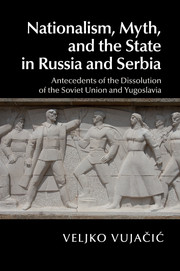Crossref Citations
This Book has been
cited by the following publications. This list is generated based on data provided by Crossref.
2015.
Publications Received.
Contemporary Sociology: A Journal of Reviews,
Vol. 44,
Issue. 4,
p.
583.
O’Loughlin, John
Toal, Gerard
and
Kolosov, Vladimir
2016.
Who identifies with the “Russian World”? Geopolitical attitudes in southeastern Ukraine, Crimea, Abkhazia, South Ossetia, and Transnistria.
Eurasian Geography and Economics,
Vol. 57,
Issue. 6,
p.
745.
Pavković, Aleksandar
2017.
Sacralisation of contested territory in nationalist discourse: a study of Milošević's and Putin’s public speeches.
Critical Discourse Studies,
Vol. 14,
Issue. 5,
p.
497.
Paul Goode, J.
2017.
Everyday Nationhood.
p.
121.
Abazi, Enika
and
Doja, Albert
2017.
The past in the present: time and narrative of Balkan wars in media industry and international politics.
Third World Quarterly,
Vol. 38,
Issue. 4,
p.
1012.
Desrosiers, Marie-Eve
and
Vucetic, Srdjan
2018.
Causal Claims and the Study of Ethnic Conflict.
Journal of Global Security Studies,
Vol. 3,
Issue. 4,
p.
483.
Coleman, Heather
Vujačić, Veljko
Üngör, Uğur Ümit
Bokovoy, Melissa
and
Bergholz, Max
2018.
A roundtable on Max Bergholz’sViolence as a Generative Force: Identity, Nationalism, and Memory in a Balkan Community.
Canadian Slavonic Papers,
Vol. 60,
Issue. 1-2,
p.
311.
Grdešić, Marko
2019.
Looking Back at Milošević’s Antibureaucratic Revolution: What Do Ordinary Participants Now Think of Their Involvement?.
Nationalities Papers,
Vol. 47,
Issue. 4,
p.
613.
Vladisavljević, Nebojša
2019.
Revolutionary Origins of Political Regimes and Trajectories of Popular Mobilization in the Late Communist Period.
Nationalities Papers,
Vol. 47,
Issue. 4,
p.
545.
Mark, James
Iacob, Bogdan C.
Rupprecht, Tobias
and
Spaskovska, Ljubica
2019.
1989.
Baković, Nikola
2019.
Remembrance of Marshal Stepa Stepanović in Čačak between (trans-)national memory and local politics.
Journal of Aesthetics & Culture,
Vol. 11,
Issue. sup1,
p.
1632098.
Ivešić, Tomaž
2020.
Od jugoslovanstva do jugoslovanstva: Komunistična partija Jugoslavije in njen odnos do nacionalnega vprašanja v prvih desetletjih obstoja.
Studia Historica Slovenica,
Vol. 20 (2020),
Issue. 2,
p.
597.
Cox, Lloyd
2021.
Nationalism.
p.
1.
Guzina, Dejan
2021.
Through the 21st century looking glass: Liberalism, democracy, and populism in a pre‐Yugoslav Serbia.
Nations and Nationalism,
Vol. 27,
Issue. 4,
p.
1097.
Lomonosov, Matvey
2021.
‘Ethnic memories’ from above? The Kosovo myth among the South Slavs and minimalist ethnosymbolism.
Nations and Nationalism,
Vol. 27,
Issue. 4,
p.
1111.
Moulioukova, Dina
and
Kanet, Roger E.
2021.
Ontological security: a framework for the analysis of Russia’s view of the world.
Global Affairs,
Vol. 7,
Issue. 5,
p.
831.
Melichárek, Maroš
2022.
Možnosť alebo nutnosť? Definícia juhoslavizmu a jej transformácie v podmienkach najnovších výskumov.
Acta historica Neosoliensia,
Vol. 25,
Issue. 2,
p.
5.
Semenov, Andrej
2022.
An analysis of Aleksandar Vučić’s 2019 national assembly speech.
Journal of Contemporary Central and Eastern Europe,
Vol. 30,
Issue. 2,
p.
259.
AK, Mehmet Ali
2023.
Rol teorisinin Ontolojik Güvenlik Boyutunun İncelenmesi: Vladimir Putin’in Balkanlar Politikası: Sırbistan Örneği.
İçtimaiyat,
p.
179.
Vulović, Marina
2023.
The Serbian Progressive Party's re-articulation of the Kosovo myth within the internal dialogue on Kosovo, 2017–2018.
European Politics and Society,
Vol. 24,
Issue. 4,
p.
518.





